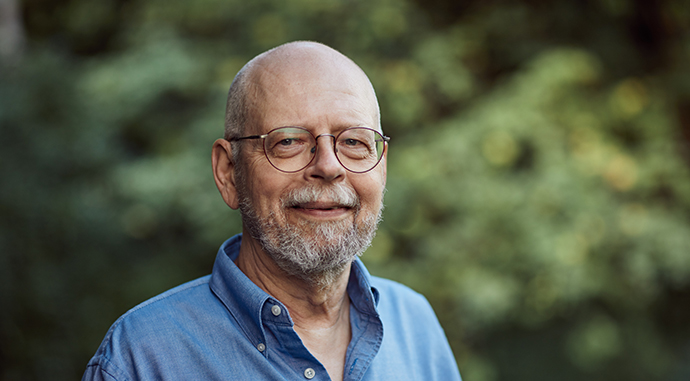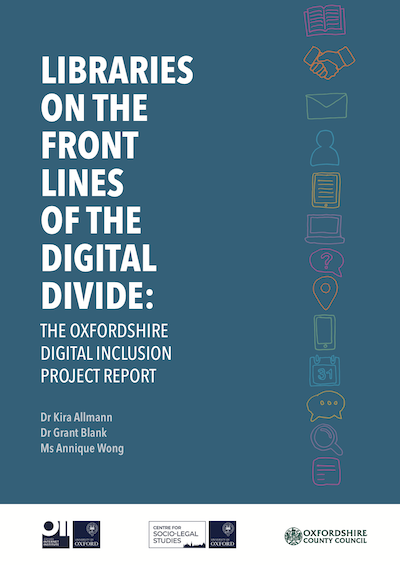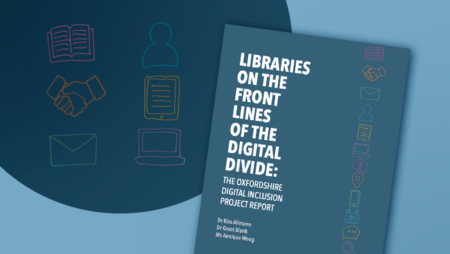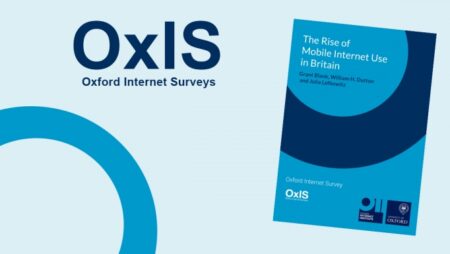


Grant Blank was a Departmental Lecturer at the OII.
He was a Survey Research Fellow until August 2020. He received the William F. Ogburn Career Achievement award from the Communication, Information Technology and Media Sociology section of the American Sociological Association in 2015. This award recognizes a sustained body of research that has made an outstanding contribution to the advancement of knowledge in the area of sociology of communication, information technology and media sociology.
He was awarded a Teaching Excellence Award from the University of Oxford in 2015.
He has been awarded a Visiting Fellowship to the Center for Advanced Internet Studies (CAIS), at the Ruhr University in Bochum, Germany for two months working on a cross-national study of echo chambers in 6 European countries and the United States. The study is unusual in that it looks at possible echo chambers in the context of the entire media environment, including online media, social media, and offline broadcast and print media. The question is, in this kind of high-choice media environment do people limit their political media consumption in such a way that they could find themselves in an echo chamber?
He is a sociologist who studies the social and cultural impact of the Internet and new media. He is also interested in cultural sociology, especially reviews and cultural evaluation.
Grant began his career as an independent consultant based in Chicago Illinois specializing in research design, statistical analysis, and database design. He previously taught at American University in Washington DC. He completed his PhD in sociology at the University of Chicago in 1999, and joined OII in 2010.
Digital divides, inequality, political participation, trust, privacy, social networks, social media, journalism, mobile use, security
Social and cultural impact of the Internet and other new media, quantitative and qualitative analysis, methodology, cultural sociology, sociology of science and technology, artificial intelligence

Research on access, use and attitudes to the Internet in Britain based on biennial surveys covering (for example) digital and social inclusion and exclusion, mobile use, social media, safety and privacy concerns, Internet regulation, and behaviour.
This project combined OxIS and census data to produce the first detailed geographic estimates of Internet use across the UK.

The project uses data from Australian and UK couples to look at the significance and impact of the Internet on intimate relationships, including how people use ICTs to meet each other and maintain relationships, and how ICTs affect their behaviour.
In the past five years my work has been financially supported the Department for Digital, Culture, Media and Sport, Google and BT. As part of my science communication and policy outreach I have served in an unpaid advisory capacity to the Department for Digital, Culture, Media and Sport, the Government Statistical Service and Ofcom.
I conduct my research in line with the University's academic integrity code of practice.

With Dr Grant Blank and Professor William H. Dutton
Interviews about rural Internet.

With Professor William H. Dutton, Dr Victoria Nash, Dr Grant Blank, Bill Thompson, Holly Goodier, and James Thickett
The launch of the OxIS 2013 Report, presenting a decade of OII-collected survey data on Internet use and attitudes in Britain.

With Professor William H. Dutton and Dr Grant Blank
In this talk, Dr Blank and Professor Dutton explain how a new pattern of Internet access is developing through the use of a growing variety of devices than enable increasing mobility.
By Kira Allmann, Grant Blank, and Annique Wong
In the era of ‘compulsory computing’, libraries offer crucial resources for those caught on the wrong side of the digital divide. Yet, this report finds that Oxfordshire libraries are significantly under-resourced when it comes to digital provision.


10 June 2021
Oxford study calls for greater government support for public libraries to help bridge digital divide

10 February 2021

20 February 2020
As Britain becomes a digital society, findings from the latest Oxford Internet Survey report consider the social implications of the rise of mobile Internet use. Are mobile-only users are missing out on internet services, compared to other groups?
9 September 2019
Research from the Oxford Internet Institute (OII), part of the University of Oxford, has revealed a rapid increase in use of the internet for commercial, banking and entertainment purposes.

Former DPhil Student
Julia was an OII DPhil student interested in tabloidization, online journalism, journalism and democracy, public sphere, corpus linguistics, and discourse analysis.

Former Research Assistant
Bianca Reisdorf holds a Diploma in Sociology (2008) from Bielefeld University, Germany. She has interests in media sociology (particularly new media) and social stratification, and has worked for public relations agencies and the German print media.

Former MSc Student
Darja Groselj is a DPhil alumna. Her thesis examined the dynamics of information exchange in virtual communities.

Former DPhil Student
Yin is fascinated by the intersection between language and technology. She researches persuasion in the context of new media, focusing specifically on the rhetoric and resonance of Brexit tweets.